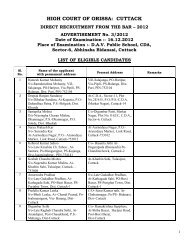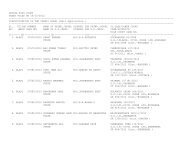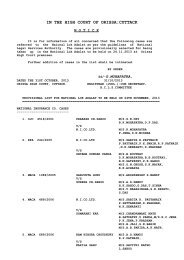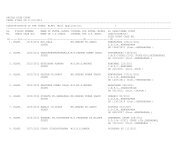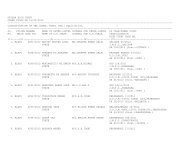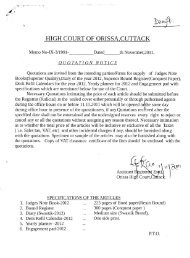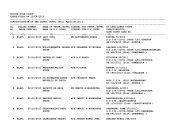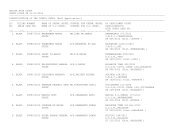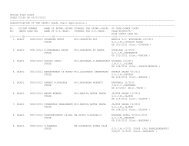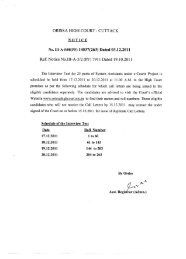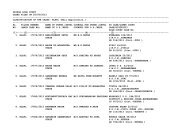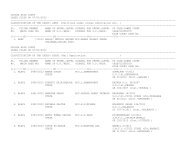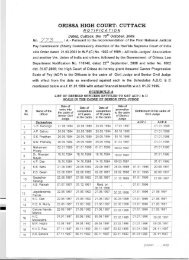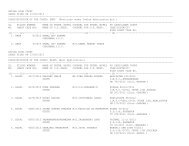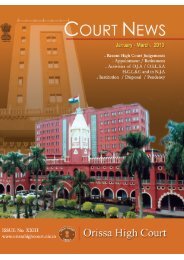ORIGINAL JURISDICTION - Orissa High Court
ORIGINAL JURISDICTION - Orissa High Court
ORIGINAL JURISDICTION - Orissa High Court
Create successful ePaper yourself
Turn your PDF publications into a flip-book with our unique Google optimized e-Paper software.
120<br />
6. From the above rival submissions made by the parties, it appears<br />
that by the impugned order, the learned District Judge returned the<br />
application to present it before a proper court at Mumbai taking into<br />
consideration Clause 19.3 of the Agreement. For better appreciation Clause<br />
19.3 is extracted hereunder:<br />
“19.3 The venue of the arbitration shall be at Mumbai. The<br />
arbitration will be governed as per Indian Laws.”<br />
From the above clause of the agreement, it appears that the venue of<br />
the arbitration shall be at Mumbai and the arbitration shall be governed by<br />
Indian Laws.<br />
M/S.D.T.M.CONSTRUCTION LTD.-V- CAPT.P.K..SRIVASTAVA [S.PANDA,J.]<br />
7. The impugned order is not coming within the purview of Section 37 of<br />
the Act which provides that the order granting or refusing to grant measures<br />
under Section 9 of the Act is appealable. In the present case, by the<br />
impugned order since the court has returned the application, the said order<br />
was not appealable under Order 7 Rule 10, CPC which provides for return of<br />
a plaint to present it before a proper court. The said order was appealable<br />
under Order 43, Rule 1, CPC and the procedure prescribed in the Civil<br />
Procedure Code is specific regarding the remedy available to a party when<br />
the court has returned the plaint. However, in the Arbitration Act, no<br />
procedure has been prescribed for return of the application nor is the CPC<br />
applicable in a strict sense to the arbitration proceeding. Therefore, this<br />
<strong>Court</strong> is of the view that the writ application is maintainable against the<br />
impugned order.<br />
8. On merits, the learned counsel for the petitioner submitted that the<br />
petitioner had moved an application under Section 9 of the Act and<br />
jurisdiction of the court was not ousted by the agreement between the<br />
parties. Therefore, the learned District Judge should have heard the matter<br />
on merits. Clause 19.3 of the Agreement provides for the venue of the<br />
arbitration and the dispute was not referred to the arbitration. He cited the<br />
decisions of the apex <strong>Court</strong> reported in AIR 2002 SC 1432 (Bhatia<br />
International v. Bulk Trading S.A. and another) and AIR 2000 SC 1886<br />
(P. Anand Gajapathi Raju and others v. P.V.G. Raju (died) and others)<br />
where it has been held that if the word “only” or “ouster” has been used in<br />
the agreement, the jurisdiction of other courts is ousted by the said<br />
agreement and the parties of the agreement can only seek their remedies<br />
before the court as agreed in the agreement. The other courts have no<br />
jurisdiction to entertain the application. However, in the present case since<br />
the word “only” or “ouster” has not been used in the said clause of the<br />
agreement, the jurisdiction of the court at Puri is not ousted by the<br />
agreement. Hence, the court at Puri has jurisdiction to hear the same. In<br />
support of his contention, he further cited the decisions of the apex <strong>Court</strong>



